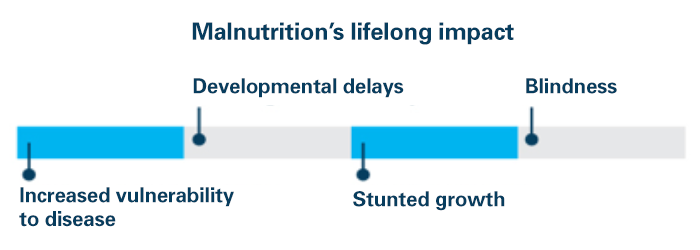Malnutrition is a serious health condition that occurs when a person's diet does not contain the right amount of nutrients to meet the person's nutritional needs. It often occurs as a result of deficiency, excess or imbalance of food nutrients. Malnutrition includes both undernutrition and overnutrition; that is, both obese and starving persons are described as malnourished but this write-up is focused on undernutrition as that is the most prevalent type of malnutrition in Nigeria.
| Source:www.slideshare.net |
The problem of malnutrition should not be taken lightly as it can cripple a child's entire life. Almost half of all deaths in under five children in developing parts of the world are attributed to malnutrition (undernutrition). Malnutrition is said to be the underlying cause of morbidity and mortality of a large proportion of children under five years old in Nigeria.
Malnourished children are prone to continuous bouts of diseases which can affect their growth and development. They are exposed to common infections, the severity and frequency of which contribute to delayed recovery or even death. Poor nutrition in the First 1000 days of a child’s life can also lead to wasting and stunted growth, which is irreversible and associated with impaired cognitive abilities and reduced school and work performance.
Infants and pre-school children depend on adults around them for their nutritional needs and if the selection of foods for them is incorrect, they may suffer from malnutrition. The process of weaning a child off breast milk increases the risk of malnutrition in that child as complementary foods offered may be deficient in certain nutrients. In Nigeria, the most common food offered to infants for complementary feeding is pap (akamu in Igbo, Ogi in Yoruba). Pap supplies carbohydrates with little or no proteins, and lack of proteins in the diet may result to severe wasting of body tissues. This can be fatal, or may lead to impaired or delayed cognitive development. It is therefore necessary that an infant's pap be enriched with some protein-rich foods like milk, egg yoke, crayfish, soybeans, deboned and mashed fish etc, as well as with fruits and vegetables. From birth to 6 months, exclusive breastfeeding is recommended to take care of the infant's nutritional needs. Beyond then, an infant's meals should be carefully planned with a balanced diet in mind.
 |
| Source:Www.unicef.ca |
Measures used in dictating malnutrition
The three commonly used measures for detecting malnutrition in children are:
1. Stunting (extremely low height for age): Stunting usually results from chronic undernutrition; it is increasingly used as the key measure of nutritional status in under two year olds. Stunting can lead to irreversible cognitive damage.
2. Underweight (extremely low weight for age).
3. Wasting (extremely low weight for height): Wasting usually results from an acute, significant shortage of food and/or disease. It a strong predictor of mortality among children below five years old.
 |
| Source:www.interactivealjazeera.com |
CAUSES OF MALNUTRITION
The UNICEF conceptual framework on malnutrition takes into account three major causes of malnutrition which include
1. Basic causes: such as human and environmental resources, economic systems, political and ideological factors. Basic causes of malnutrition often affects an entire community or nation.
2. Underlying causes: insufficient household food, inadequate maternal and Child care, and insufficient health services and unhealthy environments result to household malnutrition.
3. Immediate causes: inadequate dietary intake and diseases like diarrhea, infections etc are the immediate causes of malnutrition in children.
PREVENTION OF MALNUTRITION
Malnutrition if not checkmated can not only affect the affected persons but also influence the economic growth of the nation. The immediate causes of malnutrition can be prevented starting from the first 1000 days of a child's life, which is from the start of a pregnancy to a child's second birthday.The first 1000 days offer an opportunity for preventing undernutrition and it's consequences.
Read baby meal ideas for suggestions on healthy homemade foods you can offer your baby
Read baby meal ideas for suggestions on healthy homemade foods you can offer your baby
No comments:
Post a Comment